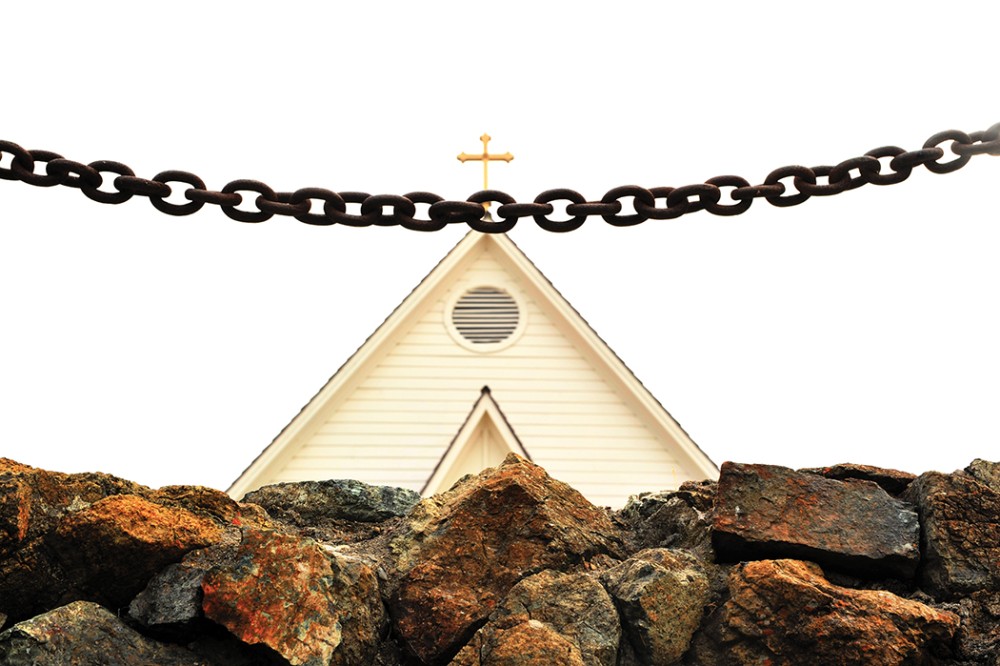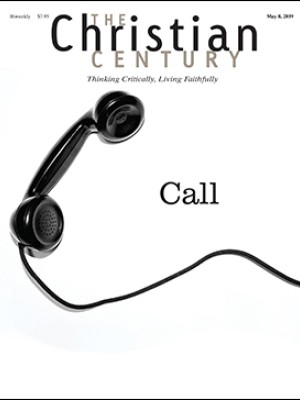Church security and the risks of hospitality
My church has Fort Knox-level safety protocols. Why?

Every day at noon, an Atlanta church I served would open its Red Door Café, offering a free meal to the city’s homeless women and men, day laborers, temporary office workers, and anyone else who wanted a meal. We didn’t check IDs or immigration status. We didn’t screen for alcohol or drugs. We didn’t search bags for concealed weapons or contraband. We just opened the door to hungry people. Isn’t that what churches are supposed to do?
A few members of the congregation had fears about the clients of the Red Door Café and questioned the wisdom of granting strangers access to the church building. A few neighbors chafed at the resulting traffic in our otherwise quiet neighborhood. But most who knew of the Red Door Café applauded and welcomed its mission.
Read our latest issue or browse back issues.
I now serve a parish in a quaint suburban village. Our building is tucked away from the highway. The nearest bus stop is more than a mile away. Our landscaped five-acre property looks like a nature preserve. The people who enter the church are mostly known to us. Nevertheless, this church has installed security protocols worthy of a Federal Reserve bank.
We monitor motion-activated cameras at every entrance. Our doors lock at specified times. We have declared ourselves a gun-free zone and advertise that status on our doors. Our ushers and educators are armed with walkie-talkies. We have developed a Sunday volunteer position called the “Walk Around”—a person who walks the property inside and out during worship, alert to signs of trouble, with 911 on speed dial. We do a background check on every volunteer. We have protocols for every imaginable emergency.
Why the Fort Knox–level security?
Part of the answer is that shootings like the ones at Tree of Life Synagogue in Pittsburgh and First Baptist Church in Sutherland Springs, Texas, have gotten lots of publicity. Since the school shooting at Columbine, Colorado, in 1999, the Washington Post has chronicled 18 fatal shootings at faith-based properties. According to the Associated Press, a dozen of those shootings occurred in the past six years.
In response to these shootings and others at public buildings, preparedness has become a theme in many churches as well as schools. Church security expert Carl Chinn says, “Odds are their church will never face a serious threat. But if their congregation does face a serious threat, the odds won’t matter much.” In that same vein, my congregation members heard this advice from a local law enforcement officer: “We don’t know when it will happen. We don’t know where it will happen. We don’t even know what ‘it’ will be. But it will happen. You would be foolish to be unprepared.”
Sometimes I am proud of our congregation’s forethought and preparedness. At other times I am ashamed of our fear. And sometimes I remember with fondness the simple rule of the Red Door Café: if you are hungry, you are welcome.
Although the Washington Post data suggests that there has been an increase in church shootings, they are still extremely rare. Congregations’ fear has mostly arisen because of the increase in mass shootings in public places and the accompanying media coverage.
According to Dallas Drake at the Center for Homicide Research, almost half of the incidences of gun violence in houses of worship are committed by persons affiliated with the congregation, and another quarter involve intimate partners. Though we are primed to fear the intrusion of a dangerous stranger, violence in houses of worship is most often perpetrated by people we know. How do we protect ourselves from that?
These facts should ease some concerns of those who lead congregations. But questions remain: What kind of security preparations should a church take? How does a church find the right balance between its commitment to hospitality and its realistic awareness of risk?
Our congregation’s deliberations about security protocols were prompted a few years ago by a member’s offer to carry a concealed handgun during worship. He is a trained sports shooter with a concealed carry permit. He expected his offer to be received gratefully. Instead, church leaders hemmed and hawed and finally turned him down.
Our hesitation was driven by two concerns. First, we were concerned for our own safety. The accuracy of any gunman—even law enforcement personnel—under high stress is poor. What would prevent a well-intentioned member from accidentally shooting a fleeing child instead of an armed gunman?
Second, we were concerned for his safety. Since Columbine, police departments and SWAT teams have been trained to engage a shooter with unrelenting firepower. They do not run into the building in response to a 911 call and politely ask if the dangerous shooter is the person wearing a green sweater or the person wearing a blue one. They neutralize any perceived threat.
We don’t arm worshipers, but we have trained them in the event of a shooting to scatter. If scattering is not possible, they should create as much chaos as they can to confuse the shooter, firing back with whatever is at hand. We were told that throwing hymnbooks can be effective in such cases.
Because of our suburban location, we had previously been casual about locking doors. Many people had keys, and sometimes the doors accidentally stayed open overnight. With five official doors and 14 other less obvious points of access, our building was a security sieve.
Now key privileges are limited, and we lock all but the front door 15 minutes after an event begins. This practice annoys members who run late, and some of them take offense. But we also know that an open-door policy means a person of ill intent could enter and roam the building undetected for a long period of time. At all main doors we installed motion-sensitive cameras, giving us the capacity to review tape for evidence. Just the presence of cameras acts as a deterrent.
Our church’s safety protocols cannot guarantee safety, but they are intended to give pause to those who might enter our house of worship with less than wholesome intent and help us prepare for and manage the unexpected. Three principles guide our deliberations about physical threat: Are we doing all we can to reasonably deter or slow danger? If deterrence fails, are we prepared to act? Do the people in our care trust us to be both eager to welcome and aware of risk?
I don’t know if the Red Door Café is still in business, but it lingers in my memory as a model of faithful hospitality. Hungry people knocked on the door each day, knowing that a friendly face and warm meal lay on the other side. I’m sure there were tense moments and sketchy strangers, but the café’s goal of welcoming the otherwise unwelcome meant that we flung the door wide open and accepted the risk.
Each congregation faces its own unique challenges. Each congregation sets its own goals. Each congregation determines its own threshold beyond which concerns for perceived safety undermine the agility of its ministry. I believe that a church cannot promise complete safety and security. It can only promise to be a trustworthy place, a place where the safety of all is taken seriously, but where the always risky act of welcoming the stranger remains key to its mission.
A version of this article appears in the print edition under the title “How much security?” The online version was edited to correct the location of the Tree of Life synagogue and update the size of the church’s property.





